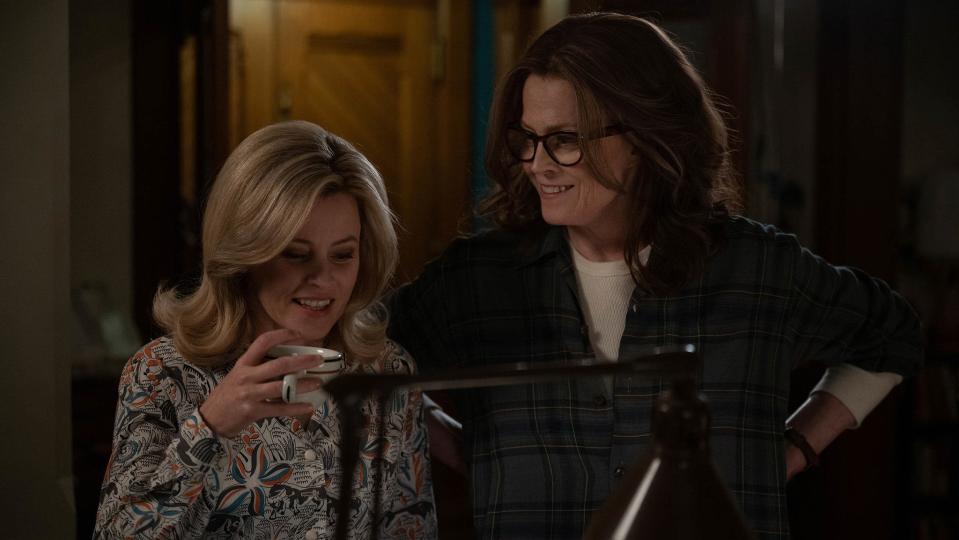New movies focusing on abortion hit Sundance as Supreme Court decision looms
Audrey Diwan had recently had an abortion when she first read Annie Ernaux's "Happening," a semi-autobiographical novel detailing the author's experience trying to obtain an abortion in 1963, when the procedure was still illegal in her native France.
Diwan, who is also French, was struck by the differences between her experience and Ernaux's a half century apart, and felt compelled to adapt the book into a feature film.
"A medical abortion is based on a routine: More or less, the woman knows what will happen to her," the filmmaker says. But for women like Ernaux, getting a clandestine abortion is filled with risks: "Are those (people) Anne meets going to help her or denounce her? Will she make it, end up in prison or die?"
"Happening," which will be released in theaters later this year, played this month's virtual Sundance Film Festival, after winning the top prize at the Venice Film Festival last September. The French-language drama is one of a handful of movies at Sundance to center on topics of abortion and reproductive rights, screening for audiences as a decision that could effectively reverse Roe v. Wade sits before the Supreme Court.
Sundance Film Festival: Ranking all the best movies we saw, including 'Am I OK?'

"Call Jane," starring Elizabeth Banks and Sigourney Weaver, is an upbeat fictionalized drama about the real-life Jane Collective, an underground network in 1960s Chicago that helped women obtain safe abortions in the years before Roe v. Wade passed in 1973. HBO's "The Janes" explores the same subject but in documentary form, using archival footage and interviews to recount the secret organization's history.
Those films arrive alongside "Midwives," a documentary detailing the struggles of two women running a makeshift medical clinic in western Myanmar, and "Nothing Compares," which delves into the life and activism of musician Sinead O'Connor, an outspoken abortion rights advocate.
All of these films are directed by women.
"What's really wonderful is that we're seeing more female filmmakers in the industry in general," says Tonya Lewis Lee, co-director of documentary "Aftershock." "And as we see more women making films, we will see more films about these issues."
Amy Poehler discovered a 'very sexy power couple' at the heart of 'I Love Lucy'

"Aftershock" is a harrowing investigation of the maternal mortality crisis and how it disproportionately affects Black women. According to the CDC, Black women are three times more likely to die from pregnancy-related causes than white women. The documentary examines how structural racism in the healthcare system factors into these deaths, illustrating how concerns of Black patients are often taken less seriously. The film posits that women of color are treated as "guinea pigs" in the hospital system: frequently assigned to doctors in training and given less access to around-the-clock quality care. Black women also have higher rates of C-sections than white mothers, even in low-risk situations.
"The narrative has been that Black women die from childbirth complications because they don't take care of themselves: They're obese, they're in poverty, they don't seek prenatal care," Lee says. "Therefore, it's not looked at as a crisis of our system. So we wanted to show the people who were really behind the statistics."
Lena Dunham returns to 'first love,' debuts 'meaningful' film 'Sharp Stick'
"Aftershock" is anchored by the stories of two Black women, Shamony Gibson and Amber Rose Isaac, who died after giving birth, and emotionally follows their families as they speak out about preventable maternal deaths. But the film also aims to offer solutions, from implicit bias training in hospitals, to expanding the use of midwives and birthing centers that encourage natural birth.
"We want people to know that it's a solvable crisis," co-director Paula Eiselt says.

"Happening" and "Call Jane" similarly hope to spark conversations around reproductive rights, months after a law went into effect in Texas that bans abortions after six weeks of pregnancy, before many even know they're pregnant. Most women start experiencing pregnancy symptoms when they're five to eight weeks pregnant, according to a study published in the Journal of Clinical Epidemiology.
Both dramas detail the legal and physical dangers facing women forced to obtain backstreet abortions. In "Call Jane," a serious heart condition puts housewife Jane (Banks) at high risk of dying during childbirth. But a board of doctors – all men – refuse to grant her an abortion and Jane considers throwing herself down the stairs, before discovering the Jane Collective.
Evan Rachel Wood reveals shocking abuse allegations against Marilyn Manson
"Happening," meanwhile, follows an intelligent young college student named Anne (Anamaria Vartolomei), who must choose between single motherhood and continuing her studies. With a promising future ahead of her, Anne desperately seeks out an illegal abortion, but finds increasing alienation from doctors, friends and romantic partners who are unwilling to support her.
"Abortion laws instrumentalize silence," Diwan says. "The women are silent because they feel a form of social shame. And many of those who are against abortion do not really know what a clandestine (abortion) journey, the violence (and) the loneliness is."
With this new crop of movies about the subject, "I look forward to how our films may be able to move the debate forward. It seems to me that this is, among other things, the vocation of art."
This article originally appeared on USA TODAY: Abortion-focused films hit Sundance as Supreme Court decision looms

 Yahoo Movies
Yahoo Movies 
